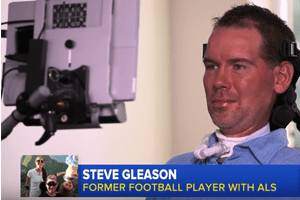
Soldiers and Athletes Diagnosed With ALS. A newly-published scientific paper contends that some soldiers and athletes diagnosed with Lou Gehrig’s disease – amyotrophic lateral sclerosis (ALS) – may have actually been victims of concussions and other brain trauma. The paper is to be published tomorrow on the Web site of the Journal of Neuropathology & Experimental […]

Soldiers and Athletes Diagnosed With ALS. A newly-published scientific paper contends that some soldiers and athletes diagnosed with Lou Gehrig’s disease – amyotrophic lateral sclerosis (ALS) – may have actually been victims of concussions and other brain trauma. The paper is to be published tomorrow on the Web site of the Journal of Neuropathology & Experimental Neurology.
The papers findings will be discussed this evening during a segment of the HBO sports program “Real Sports.” The program airs at 10 p.m. EST.
According to the ALS Association Web site, Lou Gehrig’s disease – named for the Yankee slugger believed to have succumbed to ALS in 1941 – is a progressive neurodegenerative disease that affects nerve cells in the brain and the spinal cord. Motor neurons reach from the brain to the spinal cord and from the spinal cord to the muscles throughout the body. The progressive degeneration of the motor neurons in ALS eventually leads to their death.
According to a report in the New York Daily News, ALS is rare, affecting only about 100,000 people. But NFL players have a higher rate of the disease than the general population. Statistically, only about two should have the disease, but the Daily News pointed out that since 1970, 14 NFL players have been diagnosed with ALS.
Players in other sports also have a higher rate of ALS than the population at large, the Daily News said. In Canada, eight Canadian Football League players have been diagnosed with the fatal ailment, and in Italy, more than 40 professional soccer players are victims.
According to an Associated Press report, Dr. Ann McKee, a neurology professor at Boston University and one of the paper’s authors, was able to study the brains and spinal cords of ex-Minnesota Vikings linebacker Wally Hilgenberg, former Southern California linebacker Eric Scoggins, and a boxer whose family asked that his name be kept private. All suffered head injuries in the course of their careers, and all later died of Lou Gehrig’s disease. McKee found toxic proteins in the spinal cords of all three individuals, the Associated Press said.
McKee has studied chronic traumatic encephalopathy (CTE), a disease linked to head injuries that causes cognitive decline, abnormal behavior and dementia. She said the proteins were not found in the spines of athletes with CTE who didn’t have Lou Gehrig’s disease, and they were not found in non-athletes who died of ALS, according to the Associated Press.
According to a report in The New York Times, both Mckee and her colleague, Dr. Robert Stern, said the finding solidifies a long-suspected connection between ALS-like motor disease and head trauma experienced in collision sports and combat.
“People are being misdiagnosed clinically while they’re alive as having A.L.S. when in fact they have a different motor-neuron disease,” Stern said. He added that the new information will lead to a better understanding of the disease and more effective treatments.
The paper does not address the case of Lou Gehrig specifically, but the as the Time’s points out, the baseball legend was the victim of some significant head injuries – including concussions – during his career, and was known for playing through his injuries. For example, during one game in 1934, Gehrig was hit with a pitch just above the right eye and was knocked unconscious for what was described in news reports as five minutes. Despite a headache and a large bump on his head, Gehrig played the next day.
It’s entirely possible, the Times said, that Gehrig did not die from the disease that was named for him. However, it is impossible to know for sure, as his remains were cremated.
If you’d like to know more about diseases go here: /diseases/
The personal injury attorneys at Parker Waichman LLP offer free, no-obligation case evaluations. For more information, fill out our online contact form or call 1-800-YOURLAWYER (1-800-968-7529).


